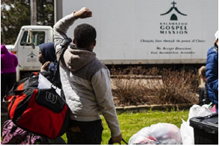Michigan Leads Multi-Agency Effort in Managing COVID-19 Case Surge Among People Experiencing Homelessness
Michigan 2020
Situation:
On November 17, 2019, the first case of coronavirus was identified in Wuhan, China, and by March 2020, the first case was identified in Michigan. As cases began to occur in Michigan, two counties in Region 5 of the state were experiencing an increase in COVID-19 positive cases among individuals experiencing homelessness. Given the unique situation, there was a lack of public health resources as to where to house the COVID positive individuals who did not need hospitalization. A hotel was acquired to be used for placement of COVID-19 positive residents experiencing homelessness, but the volume of residents became too significant for the public health staff to manage. The Medical Director for public health was needed to manage all referral calls, issues, and challenges related to oversight of the hotel population.
Response Activities:
|
State public health agencies coordinated a multi-agency response to the increase in COVID-19 cases at the hotel. Together, they created a process and procedures to meet the needs of the community. A protocol for admission to the hotel was established and discussed with referring local hospitals. Emergency medical services (EMS) agencies also were enlisted to provide added clinical support and to treat the residents at the hotel. The 5th District Medical Response Coalition provided supplies and resources to the hotel, enabling coalition members to assess and treat more residents.
|

 |
Physicians in the Western University Homer Stryker MD School of Medicine (WMed) EMS Fellowship program oversaw the admission, evaluation, and treatment of residents. Public Health personnel also worked together to support new admissions and develop a plan of care for the residents.
Impact:
ASPR funding supported Whitfield Regional Hospital at a crucial time, ensuring the hospital could not only stay open but also expand its capacity to serve the community and state throughout the pandemic. Whitfield now operates at full capacity with the ability to serve ten additional COVID-19 patients daily. Additionally, the pandemic plan provided Whitfield with a blueprint to guide effective response and preparedness efforts.

